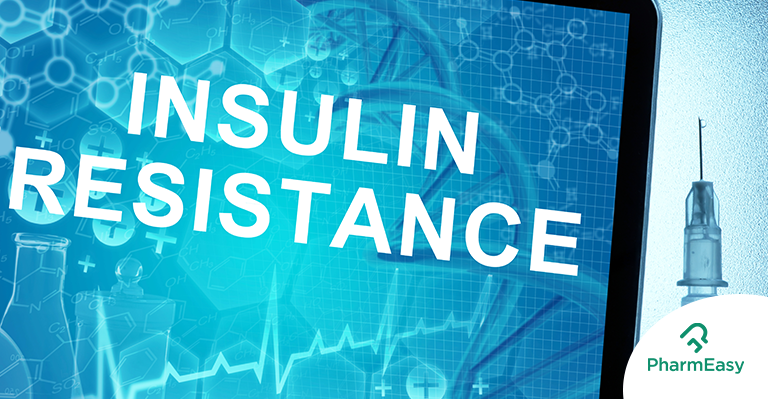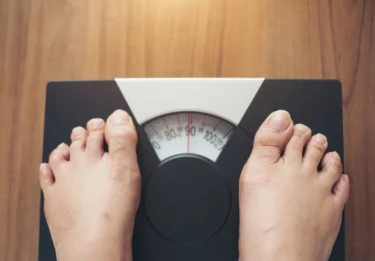Insulin Resistance: What You Need To Know
By Dr. Amruta Prabhu +2 more

Get,

to manage your symptom
Get your,


4 Cr+ families
benefitted

OTP sent to 9988776655



You’ve successfully subscribed to receive
doctor-approved tips on
Whatsapp

Get ready to feel your best.

Hi There,
Download the PharmEasy App now!!


Register to Avail the Offer
Send OTPBy continuing, you agree with our Privacy Policy and Terms and Conditions

Hi There,
Sign up on PharmEasy now!!
Trusted by 4 crore+ families

OTP sent to 9988776655



You have unlocked 25% off on medicines




Code: NU25
By Dr. Amruta Prabhu +2 more
Table of Contents
Insulin-resistance is a growing concern and is linked to conditions, such as type 2 diabetes. Although both conditions share similar symptoms, insulin resistance develops earlier and may be reversed with timely lifestyle changes. Let’s understand what insulin resistance is, and how it can be managed effectively.
Insulin is a hormone secreted by the pancreas that helps the cells of the body absorb glucose and use it for metabolism. Insulin resistance is a condition where cells are not able to use the insulin circulating in the body effectively, as they become less responsive to insulin. This leads to difficulty in absorbing glucose from the bloodstream and the accumulation of sugar in the blood. Many people who have insulin resistance have slightly elevated blood sugar levels, known as prediabetes1. This stage is known as the prediabetes stage.

It is not known exactly why one develops insulin resistance; however, overweight or obesity are risk factors for developing this condition. Other factors that may also cause insulin resistance are genetic and lifestyle factors1.
Insulin resistance can be temporary or chronic and can be manageable in some cases. Exercise is one of the fastest and the most effective ways to manage insulin resistance apart from oral anti-diabetes and anti-obesity medications, which may be prescribed by your physician to manage the condition.
Dr. Ashish Bajaj, M.B.B.S. M.D. in Clinical Pharmacology and Toxicology
Insulin resistance initially does not trigger any symptoms. You may be insulin resistant and may not even realise it. A routine blood glucose test alone may not be able to confirm insulin resistance2.
The earliest symptom of insulin resistance is weight gain, particularly around the waistline, known as central obesity. This weight gain typically appears as a fat waistline, a large belly, a fat and thick neck, a double chin, and a fatty hump at the back of the neck, with relatively thin arms and legs2.
Another symptom that people with insulin resistance have is “acanthosis nigricans”. This condition causes dark, thick skin patches in the skin folds like the groin area, armpits, and neck3.
Insulin resistance increases your risk of heart disease, stroke, and type 2 diabetes4,5.
The classic symptoms of diabetes include3:
Central obesity is the major cause of insulin resistance. It can further lead to high blood pressure, prediabetes, etc. (known as metabolic syndrome). Lifestyle changes can help avoid metabolic syndrome and further avoid any chronic lifestyle diseases.
Dr. Nikhil Yadav, MBBS MD, CCEBDM
The exact cause of insulin resistance is not known; however, it has primarily been linked to obesity and overweight. Excess fat accumulation around the belly leads to an inflammatory reaction, which starts insulin resistance6,7.
Insulin resistance is identified as an impaired biologic response to insulin stimulation of target tissues, primarily the liver, muscle, and adipose tissue. Insulin resistance impairs glucose disposal, resulting in a compensatory increase in beta-cell insulin production and hyperinsulinemia. The most common causes include obesity and overweight.
Dr. M.G. Kartheeka, MBBS, MD(Pediatrics)
Losing weight can help reduce the severity of insulin resistance and, thereby, improve glucose metabolism in the body. This includes a radical shift in dietary and lifestyle habits. The onset of insulin resistance is only a warning sign as it may be reversed by adopting healthy lifestyle habits8.
Living with insulin resistance can be rather difficult but it is not altogether impossible. Management of insulin resistance begins at home by altering your lifestyle habits, such as:

Exercise is a universally recommended lifestyle habit for all people. An exercise routine of 30-60 minutes daily can be the solution for many health problems in the world, including insulin resistance.
Resistance training done with the help of resistance bands, dumbbells, or kettlebells may be effective against insulin resistance.
A combination of resistance training and aerobic training may help reduce your insulin resistance significantly, especially when tracked over a 3-month period10.

Sleep is a highly compromised lifestyle element but a very important one in determining your overall health. Lack of sleep or poor quality of sleep can make you susceptible to health complications such as type 2 diabetes, heart diseases, and an array of infections over time. Many studies have been able to successfully establish a connection between increased insulin resistance and low levels of sleep11.

Stress is another silent killer responsible for aggravating many health conditions in people around the world. Not only does chronic stress mess up your mental health but it also takes a toll on your physical health.
Stress prompts the body to go into fight or flight mode and triggers the release of the hormones catecholamines and glucocorticoids into the body12.
Ongoing stress will keep your body on alert, leading to disturbance in glucose homeostasis, eventually leading to insulin resistance and diabetes. It is crucial that you try to keep your stress levels to a minimum by following these tips12:

Maintaining a nutritious and filling diet is important for a healthy lifestyle and keeping your insulin levels under check. Here are a few tips for changing your diet13,14:
Incorporate insoluble fibre in your diet to bulk up your stools and soluble fibre to curb hunger pangs and reduce cholesterol. Foods that provide fibre include oatmeal, legumes, oranges and flaxseeds.

When you have insulin resistance, irrespective of whether you have type 2 diabetes or not, you need to focus on losing a few pounds for your own health benefit. When starting on your weight loss journey, focus on belly fat reduction, which has been found to be directly linked with insulin resistance.
Also Read: 8 Sign & Symptoms Of Diabetes In Men
Insulin plays an important role in maintaining healthy blood sugar levels. When your body becomes resistant to it, your risk of diabetes and other health issues increases. Fortunately, insulin resistance can managed through healthy lifestyle changes such as regular exercise, a balanced diet, adequate sleep, and stress management. Early detection and regular monitoring with your doctor can help you stay in control and prevent complications.
Disclaimer: The information provided here is for educational/awareness purposes only and is not intended to be a substitute for medical treatment by a healthcare professional and should not be relied upon to diagnose or treat any medical condition. The reader should consult a registered medical practitioner to determine the appropriateness of the information and before consuming any medication. PharmEasy does not provide any guarantee or warranty (express or implied) regarding the accuracy, adequacy, completeness, legality, reliability or usefulness of the information; and disclaims any liability arising thereof.
Links and product recommendations in the information provided here are advertisements of third-party products available on the website. PharmEasy does not make any representation on the accuracy or suitability of such products/services. Advertisements do not influence the editorial decisions or content. The information in this blog is subject to change without notice. The authors and administrators reserve the right to modify, add, or remove content without notification. It is your responsibility to review this disclaimer regularly for any changes.
Comments

Leave your comment...
You may also like
Comments